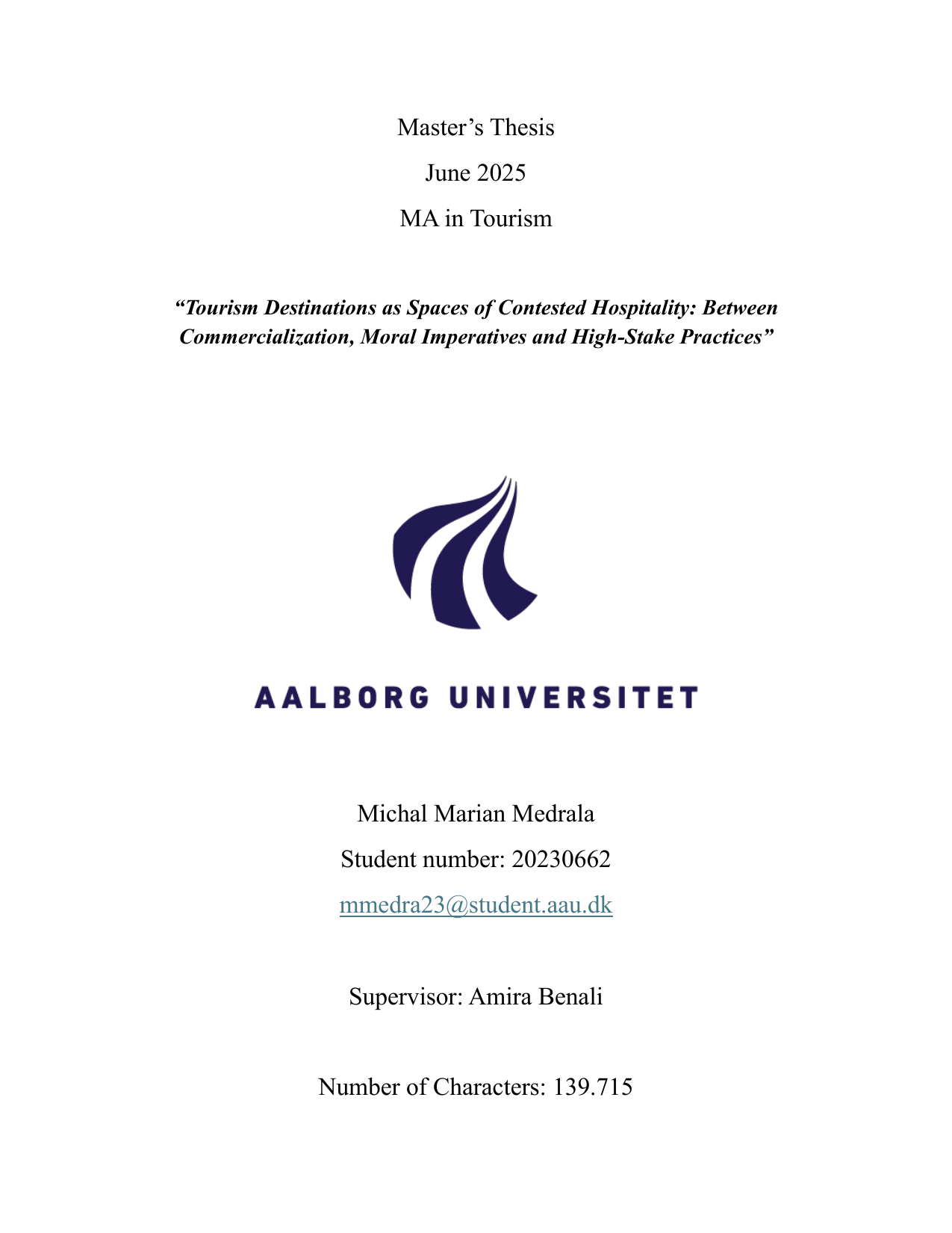
Tourism Destinations as Spaces of Contested Hospitality: Between Commercialization, Moral Imperatives and High-Stake Practices
Author
Term
4. term
Education
Publication year
2025
Submitted on
2025-06-01
Abstract
This thesis explores how tourism destinations, as spaces of hospitality, transform under pressure of migration crises, focusing on the Polish-Belarusian border region of Podlaskie. Once associated with peace, nature, and multiculturalism, the region was radically transformed after the migration crisis, which has begun in 2021. Based on qualitative research, including interviews, field observations, and discourse analysis, the project examines how power structures, infrastructure, and symbolic layer of the space have shifted within the destination, as well as how the meanings and practices of hospitality have been negotiated, and reconstructed along the way. Lastly, the project uncovers latent potential of tourism infrastructure in managing humanitarian aid and conditions necessary for a successful activation of tourism infrastructure during crises. The research is grounded in social constructivist, inductive approach, in order to uncover various meanings and points of view on the focal issues. The research relies on qualitative data collection methods - semi-structured interviews, participant observations, and discourse analysis of legal acts and media reports. The project also operates within theoretical frameworks of Jacques Derrida’s (2000) works on hospitality, Doreen Massey’s (2005) theories of space, and Pechlaner et al’s (2016) model of Extended Hospitality. As key findings, the project uncovers that the focal tourism destination during the crisis was transformed both in a physical way, through military presence in the region, new infrastructure being built in the region, new stakeholders’ presence, etc., as well as in a symbolic way, as narratives surrounding the region shifted from concerning tranquility and multiculturalism to those focused on securitization, danger, and politics. Additionally, the project identifies three distinct forms of hospitality that co-existed within the destination’s space at the same time and often clashed in fights for dominance between each other: traditional commercial hospitality, hospitality as a moral imperative, and hospitality as a criminalized act. While tourism stakeholders continue to offer hospitality to tourists, their welcome is tightly curated, silenced, and seemingly apolitical; at the same time, individual residents and activists provide support to refugees out of ethical obligation - a form of bottom-up, deeply personal hospitality that took place in the absence of institutional help. Nonetheless, those acts are still restrained by legal, emotional, and ideological boundaries. Lastly, in the most extreme form, acts of hospitality were reframed by the state as illegal, turning hospitality into a disputed and discouraged behavior, rather than a noble act. Eventually, the thesis arrives to the final argument concerning tourism infrastructure remaining unused, even though it holds potential for humanitarian response. In a stark contrast to a peripheral case of a youth hostel in Ścinawa in western Poland, which has successfully operated as a refugee center for the past three years, Podlaskie’s case highlights that prejudice, discouragement, political unwillingness and legal ambiguity undermine tourism’s potential in managing humanitarian crises, effectively bringing no benefit to anyone, only harm. As a result, the project contributes to critical tourism studies, by presenting tourism destinations not as static backdrops for tourists’ pleasure, but dynamic entities affected by a magnitude of factors, contributing to relevant processes of reframing important values such as e.g. hospitality. Additionally, Podlaskie’s case is offering valuable insights into how hospitality is never just about kindness, but always about power, place, and who is allowed to belong, thus further contributing to theories of hospitality and nuancing the complexity of this phenomenon. Lastly, on a practical basis, the project exemplifies the importance of bottom-up initiatives, sustainable lawmaking, and long-term strategic planning both in tourism management and humanitarian aid.
Keywords
Documents
